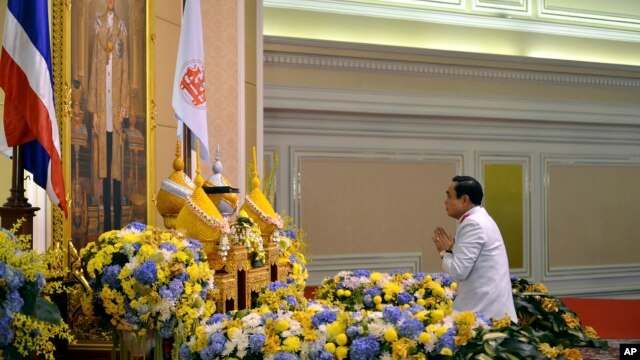
In this photo released by Thai Spokesman Office, Gen. Prayuth Chan-ocha pays a respect to a royal endorsement, black book seen at center, in front of the portrait of King Bhumibol Adulyadej as he accepted the written royal command issued by the King cert
BANGKOK—
The army general who led the May 22 coup in Thailand officially assumed the post as the kingdom’s prime minister Monday.
General Prayuth Chan-ocha bowed before a large photograph of King Bhumibol Adulyadej just after the reading of a palace decree naming him the kingdom’s 29th prime minister.
The acting secretary-general of the national legislative assembly, Norarat Pimsen, proclaimed the royal assent, stating, “His Majesty the King has endorsed General Prayuth Chan-ocha as prime minister to govern the country from this day forward.”
The general, over a span of three months, has imposed martial law, deposed the civilian government and appointed a legislature filled with military officers that unanimously selected him to become prime minister.
General Prayuth, immediately following Monday’s brief ceremony at Army headquarters, vowed to submit his selections for his cabinet in October for royal approval.
General Prayuth, still dressed in his formal white army uniform, speaking for the first time as prime minister said Thailand is confronted by many problems. He notes these need to be solved ahead of the realization next year of the ASEAN Economic Community, in which Thailand, as the region’s second-largest economy, is expected to play a leading role.
The 60-year-old general, who is due to retire from the army next month, is the first coup leader to serve as prime minister since 1957.
General Prayuth was also a key figure in the coup in 2006 that ousted then-prime minister Thaksin Shinawatra, the billionaire telecommunications tycoon whose political parties have won every national election for more than a decade.
His younger sister, Yingluck Shinawatra, was forced from office shortly before this year’s coup after an extended period of political turmoil.
Officials of the junta, known as the National Council for Peace and Order, say General Prayuth wants to permanently eradicate the influence of the Shinawatra clan.
Thailand has been polarized between the mainly urban royalist elite and middle class who are strongly opposed to the Shinawatras and their main backers, who are mostly the rural poor.
With Thailand still under martial law, giving authorities broad powers to round up dissenters for interrogation, opposition to the junta has been effectively squelched inside the country.
Thai critics abroad, most of whom are now considered fugitives by the military government, have condemned General Prayuth's actions as an illegal power grab.
The coup has also been criticized by Western governments, which are urging a quick return to democracy.
The army chief has pledged to create a “Thai-style” democracy, which he contends “will return happiness to the people.”
The reform process, to be followed by elections, he has said will take at least one year.
In his seven-minute address Monday the general reiterated a call for qualified people to join the national reform council the junta is establishing. The new prime minister says he wants members from political and civic groups, economists, academics, civil servants and the media, among others.
General Prayuth declared, “I do not want anyone to be left behind in the democratic process.” |
|
